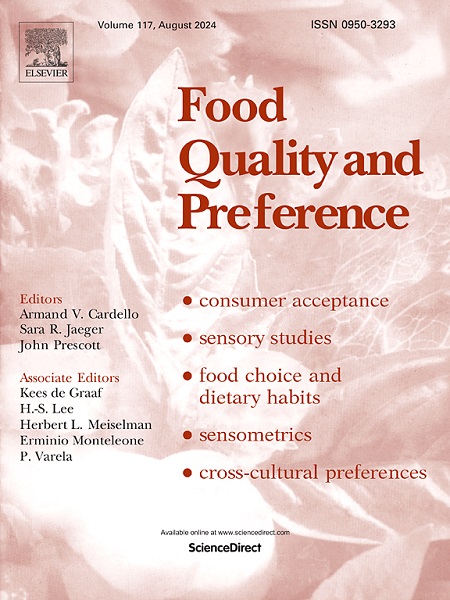走向健康和可持续的饮食:探索影响西方国家过度消费红肉的因素
IF 4.9
1区 农林科学
Q1 FOOD SCIENCE & TECHNOLOGY
引用次数: 0
摘要
过量食用红肉和加工肉会带来健康风险,并导致环境退化。这项研究调查了导致这类消费减少的因素,特别是在过度消费者中,过度消费者定义为超过世界卫生组织(who)设定的肉类消费建议的个人,并报告在四周内每周食用红肉和加工肉超过四次。为此,我们扩展了计划行为理论(TPB)。我们介绍了个人规范作为社会规范、感知行为控制和减少肉类消费态度之间的中介。此外,通过纳入食物选择动机量表,我们确定了可能有效激励过度消费者减少消费的驱动因素。来自意大利(n = 524)和法国(n = 513)的调查数据显示,减少肉类消费的意图与行为改变密切相关。关键的预测因素包括个人规范、社会影响、感知控制以及与健康、可持续性和便利性相关的动机。这些关联在两国保持一致,这表明类似的因素影响了西方消费者的肉类减少。我们的发现强调了通过针对减少肉类消费的行为驱动因素来改善公众健康和促进可持续食品实践的潜力。本文章由计算机程序翻译,如有差异,请以英文原文为准。
Towards a healthy and sustainable diet: exploring factors influencing red meat consumption among excessive consumers in Western countries
Excessive red and processed meat consumption poses health risks and contributes to environmental degradation. This study investigates factors driving reductions in such consumption, especially among excessive consumers, defined as individuals who exceed the meat consumption recommendations set by the World Health Organization (WHO) and who report to consume red and processed meat more than four times per week over a four-week period. To this end, we extend the Theory of Planned Behavior (TPB). We introduce personal norms as a mediator between social norms, perceived behavioral control, and attitudes toward reducing meat consumption. Additionally, by incorporating the Food Choice Motives scale, we identify drivers that may effectively motivate excessive consumers to reduce consumption. Survey data from Italy (n = 524) and France (n = 513) reveal that intentions to reduce meat consumption strongly align with behavior change. Key predictors include personal norms, social influences, perceived control, and motives related to health, sustainability, and convenience. These associations remain consistent across both countries, suggesting similar factors influence meat reduction among Western consumers. Our findings underscore the potential to improve public health and promote sustainable food practices by targeting behavioral drivers of reduced meat consumption.
求助全文
通过发布文献求助,成功后即可免费获取论文全文。
去求助
来源期刊

Food Quality and Preference
工程技术-食品科技
CiteScore
10.40
自引率
15.10%
发文量
263
审稿时长
38 days
期刊介绍:
Food Quality and Preference is a journal devoted to sensory, consumer and behavioural research in food and non-food products. It publishes original research, critical reviews, and short communications in sensory and consumer science, and sensometrics. In addition, the journal publishes special invited issues on important timely topics and from relevant conferences. These are aimed at bridging the gap between research and application, bringing together authors and readers in consumer and market research, sensory science, sensometrics and sensory evaluation, nutrition and food choice, as well as food research, product development and sensory quality assurance. Submissions to Food Quality and Preference are limited to papers that include some form of human measurement; papers that are limited to physical/chemical measures or the routine application of sensory, consumer or econometric analysis will not be considered unless they specifically make a novel scientific contribution in line with the journal''s coverage as outlined below.
 求助内容:
求助内容: 应助结果提醒方式:
应助结果提醒方式:


